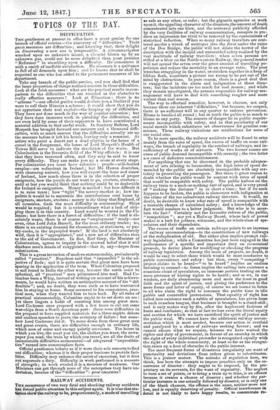TOPICS OF THE DAY.
DIFFICULTIES.
Inn gentlemen at present in office have a great genius for one branch of official routine—the discovery of " difficulties." Their great resources are difficulties; and knowing that, their delight on discovering a new one is irrepressible. A circumnavigator wrecked upon an unknown island, a chemist blown up by an unknown gas, could not be more delighted than your genuine " Reformer " in stumbling upon a difficulty. He announces it with a smirk of ineffable satisfaction. He accounts it a quittance in full of all demands upon him ; and he knows that he shall be respected as one who has added to the permanent resources of his department. Take any branch of the public service, and you shall find that the large proportion of things realized consists in these difficulties. Look at the Irish measures : what are the practical results in com- parison to the difficulties that are vaunted as the obstacles to really effective measures ? Look at Education : there is no "scheme "—our official guides would declare you a libeller if you were to call their Minutes a scheme ; it would show that you do not appretiate their real exploit—the heaping up of difficulties. They have not done much in the way of popular education ; but they have done immense work in parading the difficulties, and are even held by some of their supporters to have contributed a material addition to that useful stock. In Sanitary Reform, Lord Morpeth has brought forward one measure and a thousand diffi- culties, with so much success that the difficulties actually ate up the measure before it left his hands, leaving only a remnant. As
artists who paint a desert put a dead pilgrim or the bones of a camel in the foreground, the bones of Lord Morpeth's Health of Towns Bill serve to indicate the desolation of the waste. But Colonization is the favourite field of the Whig officials : it is one that they have traversed often, and they may be said to know every difficulty. They can make you up a score at every stage. For colonization you must have colonists : people—able-bodied couples—are redundant in Ireland ; but Mr. Hawes describes, with charming naiveté, how you will export the bone and sinew of Ireland, how much abuse there is in the selection of proper emigrants, how the people do not want to go, etcetera, etcetera- amtil at last you would think that nothing could be so deplorable for Ireland as emigration. Money is needed : but how difficult it is to raise taxes ; how " tight " the money-market is; - how im- politic it would be to supersede the contributions sent home by emigrants, etcetera, etcetera: money is the thing that England, of all countries, finds the most difficulty in commanding. Ships would be required; but it is extraordinary what a lack of ship- ping there is in this country. Land would be wanted in the Co- lonies, but here there is a forest of difficulties : if the land ie ab- solutely.waste, there is of course no "employment" ready—not even, cries Lord John Russell, for the most ordinary trades ; no, there is no existing demand for shoemakers, or stationers, or pas- try-cooks, in .the unpeopled waste ! If the land is not absolutely wild, then it is "appropriated," and a new set of difficulties rises to the aid of Government. In fine, Earl Grey, the Minister of Colonization, agrees to inquiry in the avowed belief that it will disabuse men's minds of exaggerated—that is, any—hopes from colonization.
This is a great invention of modern statesmanship, preeminently called "practical." Napoleon said that " impossible " is the ad- jective of fools ; and it is quite certain that great men have been sparing in the application of the term. When Columbus proposed to sail round to India the other way, because the earth must be spherical, all " practical " men pronounced him mad. Had Co- lumbus been a Whig, instead of writing an account of his achieve- ments, he would have written an anticipative account of his " dif- ficulties"; and, no doubt, they were such as to have warranted him in staying at home. Some occurred to his companions, prac- tical men, when they wanted him to turn back. By all rules of practical statesmanship, Columbus ought to be set down an ass : yet there lingers a habit of counting him among great men. Lord Cochrane once proposed with a few boats to cut out some war-ships from a South American port : there were difficulties in the proposal to- have supplied materials for a three-nights debate and endless speeches to prove the certainty of failure : but some- how Lord Cochrane did it. To come down from these great men and great events, there are difficulties enough in ordinary life, which men of sense and energy quietly overcome. The house in which you live, the meat you eat, the clothes you wear, the news- paper you read, the train by which you travel, are all the fruits of innumerable difficulties surmounted—of oft-proved "impossibili- ties" turned into commonplace facts.
Official gentlemen behave as if it were their sole concern to find out difficulties; whereas it is their proper business to provide faci- lities. Difficulty may enhance the merit of execution, but it does not supersede a duty. Difficulty in work performed is a measure of strength; in work evaded it is a measure of weakness. Our Ministers can get through none of the enterprises they have un- dertaken, because of the "difficulties": poor creatures !


























 Previous page
Previous page